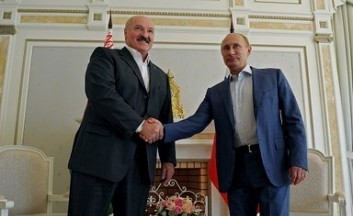Main results of 2012: Belarus is becoming increasingly entrenched in the political framework of the Eurasian integration
 The situation has not changed
The situation has not changed

Foreign Policy: coasting towards the Kremlin
The main result of the year in the foreign policy of President Lukashenko is preservation of the status of the sole mediator between the Belarusian political establishment and Russian elites both at the Kremlin and constituent entities of the Federation. This intermediary status guarantees him immunity in Belarus – at least for as long as he can provide a resource support to Belarusian economy from Russia, be it favorable prices for energy resources or credit support.
After the presidential election in 2010, the foreign policy of Belarus has not changed and is characterized by freezing of the Western direction with a gentle participation of Belarus in the process of Eurasian integration. Consequently, Lukashenko is increasingly isolated in the political framework of the new Eurasian Economic Union. The range of Lukashenko’s summit meetings in 2012 is limited to the leaders of Russia, Turkmenistan, Kazakhstan, Azerbaijan and Ukraine. We should also highlight Lukashenko’s visit to Latin America in June, including Venezuela, Ecuador and Cuba. The geography of trips abroad is also narrowed: in 2011 Lukashenko held nine visiting summit meetings, in 2012 – 8, and 4 out of the 8 meetings were held in Russia, 3 – in the “Latin American” tour, and one – in Ashgabat. Also, there is a trend of “domestication” of President Lukashenko. In 2012, he had 19 contacts at the summit level with the presidents of other countries, 11 of which took place in the capital of Belarus, and 6 of them were telephone calls, 3 of which – with Russian President Putin. To compensate for this trend in autumn and early winter, the President had to make a greater use of media tools, such as interviews the western mass media, meetings with Russian journalists and editors-in-chief of the CIS mass media.
Throughout the year, the President demonstrated a consistent and tough approach to the conflict with the West. In February-April, the authorities attempted to impose on the EU and the U.S. their own – in stages – scenario to fulfill the conditions set for Belarus, the main of which is the release and rehabilitation of all political prisoners. President Lukashenko announced his intention to conduct a political modernization and freed the former candidate A. Sannikov and his authorized representative D. Bondarenko. The authorities expected the West to give a similar response and start a gradual withdrawal of the sanctions. As this did not happen, Minsk just took “cosmetic” measures, such as the change MFA executive officers (S. Martynov to V. Mackey) and conducted the parliamentary campaign without any political repression. Thus, one may claim that the significant increase in international activity of the official Minsk after the appointment of Foreign Minister Mackey is due primarily to the initiative of Mackey himself. The key to resolve the political conflict with the EU and the U.S. is in the hands of President Lukashenko, and this greatly limits the MFA opportunities as an intermediary in negotiations with external partners of the Republic of Belarus.
Some of the authorities’ actions at the end of the year gave some grounds for believing that the governing group activated unofficial negotiations with the IMF on a new round of financial support. In particular, on December 14, the National Bank hastily stopped servicing client accounts of the law enforcement agencies (which had not been reported in advance), and on December 19, in Moscow, President Lukashenko requested the administration of the Russian Federation for a “low-cost” loan of USD 2 billion allegedly aimed for modernization of Belarusian enterprises. However, Lukashenko conscientiously does not conform to the main condition for the resumption of political relations with the West, i.e. does not release the remaining political prisoners.
* It is reported that on December 20 there was a parliamentary group “Initiative” established at the House of Representatives. The group is under the supervision of the delegate from Stolbtsy parliamentary division, N. Ivanchenko (the Presidential Advisor – Chief Inspector for Minsk Region). It is most likely that this group will play the role of the center of policy initiatives in the parliament controlled by the President.
Subscribe to our newsletter




Situation in Belarus
Constitutional referendum: main consequences


 Video
Video
How to count the political prisoners: are the new criteria needed?


 Video
Video
Paternalism In Decline, Belarusian Euroscepticism, And The Influence Of Russia


 Video
Video












